THE MAN BEHIND THE NECKERCHIEF:
THE OBESE TALENT OF DON KNOTTS
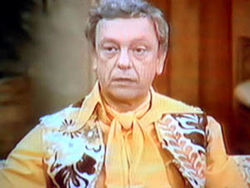
By Hollis James
Sometimes the planets align for an actor—and an audience—when the perfect performer meets their ideal role: Fred Gwynne as
Herman Munster, Bea Arthur as Maude, George Hamilton as Evel Knievel. But in the case of Don “The Magic Juan” Knotts, he pulled
off the impossible, reaching perfect symbiosis twice, first as The Andy Griffith Show’s Mayberry deputy Barney Fife and
secondly as Three’s Company landlord Ralph Furley.
Blessed with five-hundred pounds of oomph! in a one-hundred pound bag, Jesse Donald Knotts came out of Morgantown,
West Virginia, determined to make a name for himself as an entertainer. He headed to NYC, trying to break in as a ventriloquist.
But when World War II broke out, a 19-year-old Don enlisted in the Army’s Special Services Branch, and began entertaining the
troops. Don soon ditched the ventriloquist dummy—which, incidentally, marked the last time he’d ever work with a comedy partner
that weighed less than him.
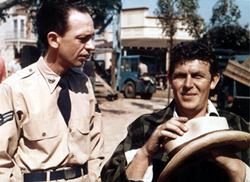 After the Army, Don headed back to New York with his newfound Special Services contacts and was soon cast in the Broadway show
No Time for Sergeants. The star of the show was a man who would later change Don’s life, none other than that tall drink
of North Carolina water, Andy Griffith. The two also starred in the film adaptation of the military spoof, and once it was over,
Andy would never forget that “skinny, funny guy.”
After the Army, Don headed back to New York with his newfound Special Services contacts and was soon cast in the Broadway show
No Time for Sergeants. The star of the show was a man who would later change Don’s life, none other than that tall drink
of North Carolina water, Andy Griffith. The two also starred in the film adaptation of the military spoof, and once it was over,
Andy would never forget that “skinny, funny guy.”
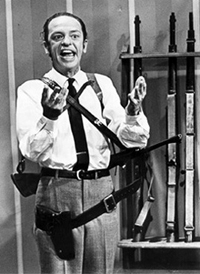 Don soon began performing for his first big television audience as a regular on the Tonight Show. That’s the REAL
Tonight Show, which was hosted by Steve Allen. Don made his mark during man-on-the-street segments playing a character
called the Nervous Man. Don’s character created a new definition of “high strung,” whose shaking visage could barely ejaculate
a clipped, high-pitched “No!” when asked if he were a little nervous. There are elements of Barney Fife and Ralph Furley in the
primordial sludge of this character, and the ticks and mannerisms developed here would stand him in good stead for the rest of
his career. When Jack Paar took over for Steve Allen and the Tonight Show moved from NYC to Los Angeles, Don was cast in
his friend Andy Griffith’s new show, playing Barney Fife.
Don soon began performing for his first big television audience as a regular on the Tonight Show. That’s the REAL
Tonight Show, which was hosted by Steve Allen. Don made his mark during man-on-the-street segments playing a character
called the Nervous Man. Don’s character created a new definition of “high strung,” whose shaking visage could barely ejaculate
a clipped, high-pitched “No!” when asked if he were a little nervous. There are elements of Barney Fife and Ralph Furley in the
primordial sludge of this character, and the ticks and mannerisms developed here would stand him in good stead for the rest of
his career. When Jack Paar took over for Steve Allen and the Tonight Show moved from NYC to Los Angeles, Don was cast in
his friend Andy Griffith’s new show, playing Barney Fife.
 Barney Fife is equal parts Deputy Droopalong and Biff Lowman. Don’s Barney was initially laughable as the inept public servant
who aspired to become that imposing, idealized lawman that everyone but Fife knew he could never become. Yet there was a palpable
and supreme sadness to Barney’s life, one eternally spent in Sheriff Andy Taylor’s shadow—where nothing “Biff Fife” did was
good enough for “Papa Andy.” Andy kept Barney in a state of eternal infantilism, only speaking to him to either chastise or
patronize. Barney’s ineffectual self-awareness was a tack certain episodes even focused on. I always suspected that Don’s Barney
(or at least “my” Barney) seethed with silent rage. He begrudgingly felt he was forced into Omega-male status in Mayberry
simply because Andy tricked the whole town—including Barney—into believing that Taylor the Elder was Mayberry’s Alpha male,
thanks to a truckload of silver-tongued homespun bullshit. As a child, I used to envision a bloody coup wherein Barney would assassinate
Andy, then kill Opie—lest Taylor the Younger come back later for revenge. Barney could pose the corpses of the father and son naked
(in a 69-position, of course), and sell the murder as the coup de grâce in an incestuous, gay child-sex ring gone horribly bad.
Otis the drunk would be easy to frame for the murders, given the souse’s recurring blackouts. Then Barney would finally be free
to be the Mayberry man he always aspired to, kicking ass and taking names—and building up his self-esteem by smacking
Barney Fife is equal parts Deputy Droopalong and Biff Lowman. Don’s Barney was initially laughable as the inept public servant
who aspired to become that imposing, idealized lawman that everyone but Fife knew he could never become. Yet there was a palpable
and supreme sadness to Barney’s life, one eternally spent in Sheriff Andy Taylor’s shadow—where nothing “Biff Fife” did was
good enough for “Papa Andy.” Andy kept Barney in a state of eternal infantilism, only speaking to him to either chastise or
patronize. Barney’s ineffectual self-awareness was a tack certain episodes even focused on. I always suspected that Don’s Barney
(or at least “my” Barney) seethed with silent rage. He begrudgingly felt he was forced into Omega-male status in Mayberry
simply because Andy tricked the whole town—including Barney—into believing that Taylor the Elder was Mayberry’s Alpha male,
thanks to a truckload of silver-tongued homespun bullshit. As a child, I used to envision a bloody coup wherein Barney would assassinate
Andy, then kill Opie—lest Taylor the Younger come back later for revenge. Barney could pose the corpses of the father and son naked
(in a 69-position, of course), and sell the murder as the coup de grâce in an incestuous, gay child-sex ring gone horribly bad.
Otis the drunk would be easy to frame for the murders, given the souse’s recurring blackouts. Then Barney would finally be free
to be the Mayberry man he always aspired to, kicking ass and taking names—and building up his self-esteem by smacking
 Goober and Gomer around. Then again, in some dreams I would envision Opie escaping downriver Moses-style (via Aunt Bea, who'd wrap him
in swaddling clothes)—Roanoke River standing in for the Nile—only to have Opie grow up and come back for some
Old Testament-quality revenge. But I guess we all had these dreams, didn’t we? No…? Just me…? I’m really sorry to hear that.
Back to Don…
Goober and Gomer around. Then again, in some dreams I would envision Opie escaping downriver Moses-style (via Aunt Bea, who'd wrap him
in swaddling clothes)—Roanoke River standing in for the Nile—only to have Opie grow up and come back for some
Old Testament-quality revenge. But I guess we all had these dreams, didn’t we? No…? Just me…? I’m really sorry to hear that.
Back to Don…
Hollywood came calling for Knotts, and—unlike a great deal of character actors who only got scripts that play to their
type—Don was lucky to get a treasure trove of parts that played against his type. Scripts would showcase Don as either
a “shakily nervous pipsqueak” forced to wear the pants of a much tougher man (such as in the remake of The Paleface,
The Shakiest Gun in the West) or as…well…as a “shakily nervous pipsqueak” forced to wear the pants of a much more
romantic man (such as in The Love God?). Don’s movie career was very successful by all standards for a simple reason:
He wasn’t really competing with anyone. Let’s face it, no couple drove to their local movie theater bickering over whether to
 see The Ghost and Mr. Chicken or Who’s Afraid of Virginia Woolf? To paraphrase an adage often attributed to
fellow gifted thespian Christopher Walken: “You don’t get a Don Knotts type, you get Don Knotts!” Don starred in Disney
pics opposite highly charismatic Volkswagen Beetles and charming football-playing mules—and in hundreds of mid-70s buddy
pictures opposite the less charismatic and less charming Tim Conway. But the small screen would soon beckon its skinny son
home, and Don was about to enter the greatest phase (wardrobe-wise) of his career.
see The Ghost and Mr. Chicken or Who’s Afraid of Virginia Woolf? To paraphrase an adage often attributed to
fellow gifted thespian Christopher Walken: “You don’t get a Don Knotts type, you get Don Knotts!” Don starred in Disney
pics opposite highly charismatic Volkswagen Beetles and charming football-playing mules—and in hundreds of mid-70s buddy
pictures opposite the less charismatic and less charming Tim Conway. But the small screen would soon beckon its skinny son
home, and Don was about to enter the greatest phase (wardrobe-wise) of his career.
In 1979, when Don joined the misinterpretation ménage a trios Three’s Company—replacing the Ropers as landlord—he didn’t
just bring Barney Fife to California. He created a new character, Ralph Furley: a ladies man without ladies, a defenseless
weakling who nonetheless boasted his hands were lethal weapons, a homophobe we couldn’t hate, and—most importantly—the greatest
fashion plate television would ever see. Plaids and stripes don’t go together? Guess again, TV viewer! Polyester can’t look
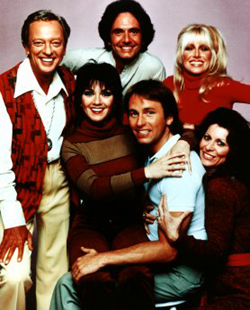 good? Au contraire! Think neckerchiefs are simply the domain of cowboys, boy scouts and miniature Schnauzers? Wrong again!
Ralph Furley, whom people forget lasted five seasons compared to Stanley Roper’s two, elicited laughs the second he entered
the room. Don was from the “working from the outside in” school of acting, which Laurence Olivier and Lon Chaney made famous.
Why go method actor, renting out a room in your house to two women and one man, then mishearing information and bursting in
only to look like a fool, when you can simply buy a leisure suit that will get a laugh the second you make your on-air entrance?
Don’s Ralph Furley was equal parts Big Brother and gay uncle—always hovering dangerously nearby, ready to burst in and evict
our jiggle-com protagonists, yet laughably ineffectual once he tries to drop the axe. Don breathed life into a show still
reeling from the loss of the comedic genius Suzanne Somers and the super sexy Norman Fell. Time and time again, Don proved
that no matter the movie, TV show or stage play, he could lay down the Hollywood pimp slap of a man thrice his weight.
good? Au contraire! Think neckerchiefs are simply the domain of cowboys, boy scouts and miniature Schnauzers? Wrong again!
Ralph Furley, whom people forget lasted five seasons compared to Stanley Roper’s two, elicited laughs the second he entered
the room. Don was from the “working from the outside in” school of acting, which Laurence Olivier and Lon Chaney made famous.
Why go method actor, renting out a room in your house to two women and one man, then mishearing information and bursting in
only to look like a fool, when you can simply buy a leisure suit that will get a laugh the second you make your on-air entrance?
Don’s Ralph Furley was equal parts Big Brother and gay uncle—always hovering dangerously nearby, ready to burst in and evict
our jiggle-com protagonists, yet laughably ineffectual once he tries to drop the axe. Don breathed life into a show still
reeling from the loss of the comedic genius Suzanne Somers and the super sexy Norman Fell. Time and time again, Don proved
that no matter the movie, TV show or stage play, he could lay down the Hollywood pimp slap of a man thrice his weight.
Now that Don is dead, it’s up to all of us to continue his legacy. I’m doing my part, continually searching for overseas
funding to put up my one-man show, “Untying Knotts” starring John Waters. Don’t worry; once I get the funding, John will
sign on. But the great man himself isn’t truly gone. Sure, we can catch glimpses of Don doing late-era cameos such as in
Pleasantville or hear him voicing some animal in Chicken Little. But Don’s legacy will continue to live on
forever thanks to Fife & Furley: the twin towers of the sitcom skyline. One can almost see Don backed into some corner of
heaven right now, one finger nervously tugging at his neckerchief, another finger shakily stroking the trigger of his sidearm.
And the question all you angels have to ask yourselves is, do you feel lucky? Well…do ya, cherubs?
Don Knotts (1924—2006) R.I.P.
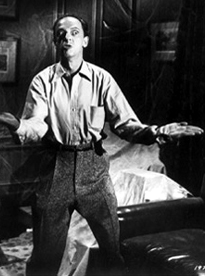
|





































